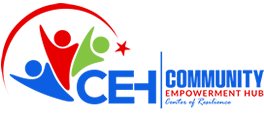Emergency and Humanitarian Response
- Community Empowerment Hub
- Emergency and Humanitarian Response
Somalia's arid and semi-arid regions are frequently affected by natural disasters such as droughts, floods, and locust invasions, which exacerbate existing vulnerabilities and threaten the livelihoods of millions. CEH’s Emergency and Humanitarian Response program focuses on providing immediate relief while laying the foundation for long-term recovery. Program Goals:
- Provide timely and effective relief during crises to reduce suffering and save lives.
- Strengthen community resilience to reduce dependency on external aid during future crises.
- Support recovery efforts through early rehabilitation and restoration of livelihoods.
Key Activities:
Food and Water Distribution: During times of drought or conflict, CEH distributes food aid and water to vulnerable households.
Health and Hygiene Support: CEH provides basic health services and hygiene kits to prevent the spread of diseases in displaced populations.
Disaster Risk Reduction (DRR): CEH conducts community training on disaster preparedness, ensuring that communities are equipped to deal with future crises.
Emergency Shelter and NFI Kits Distribution: CEH provides emergency shelter solutions and Non-Food Item (NFI) kits to families displaced by crises. These kits often include essential items like blankets, cooking utensils, hygiene kits, and shelter materials, helping families meet basic needs and maintain dignity in difficult times.
Gender-Based Violence in Emergencies (GBVie): Recognizing that emergencies can heighten the risk of gender-based violence, CEH has developed specialized programs to prevent and respond to GBV in emergency settings. This includes establishing safe spaces, providing psychosocial support, and linking survivors to essential services, ensuring that vulnerable individuals receive the protection and care they need.
Anticipatory Action/Crisis Modifier: To mitigate the impact of foreseeable crises, CEH uses anticipatory action mechanisms, mobilizing resources and initiating response activities before a crisis reaches full scale. The crisis modifier approach enables rapid deployment of resources, helping communities respond effectively to emerging threats and minimize damage.
Multipurpose Cash Assistance (MPCA): MPCA programs provide affected households with direct cash transfers, giving them the flexibility to address their unique needs. This approach empowers beneficiaries by offering autonomy in how they spend the funds, while also supporting local economies and fostering a faster recovery process.
Camp Coordination and Camp Management: In instances where displacement leads to the establishment of temporary camps, CEH plays a role in coordinating and managing these settlements. This involves organizing shelters, ensuring access to essential services, and maintaining site safety. Effective camp management helps uphold human dignity, safety, and order in challenging situations.
Dissemination of Early Warning and Early Action (EWEA): CEH actively participates in the dissemination of Early Warning and Early Action (EWEA) systems, which are crucial forpreparing communities ahead of anticipated crises. By providing timely information and recommended actions, CEH enables communities to prepare, reduce potential losses, and act swiftly in the face of impending disasters.



